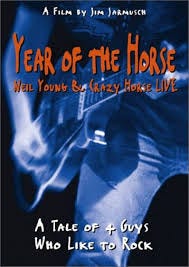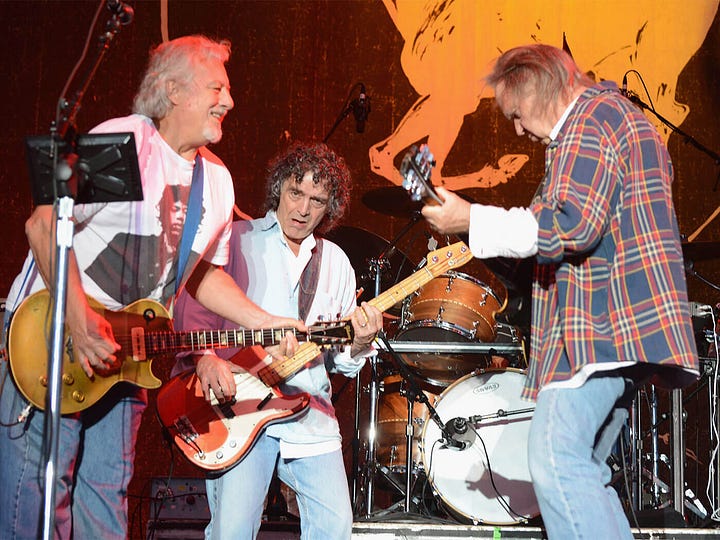For a while now, I’ve been spending part of my day listening to Neil Young, working on a future book about his long, diverse, unprecedented and sometimes crazy musical journey.
Since the only logical way to start with a career as long and winding as Neil Young’s is to start at the beginning, it’s been interesting re-listening to his songs in their chronological order, going all the way back to the late sixties and early 70’s, tracing his progression and many diversions.
From Buffalo Springfield to Crosby, Stills and Nash to his work with Crazy Horse and a bunch of other projects too many to name, Young was prolific, wide-ranging, unpredictable and, maybe this is the best word for him, constant. He always seemed to have something coming.
He just turned 79. Yet, just today on Facebook, I read that he’d recently re-discovered an entire album he recorded in Nashville about 40 years ago and is fixing it up for release now. If you wander through his Neil Young Archives, there’s enough music there to carry you through 79 years. Or just about.


To change things up a bit, I decided to take another look at a Neil Young and Crazy Horse DVD that I bought in 1996, eight long years ago. “Year Of The Horse” is a film made by director Jim Jarmusch, an independent filmmaker who’d hired Neil to do the soundtrack for his film “Dead Man.”
Shot in intentionally grainy 16mm and Super 8, it’s a playful film that opens with Neil prankishly setting fire to a array of flowers in his hotel room in Glasgow which almost gets out of control — a nice metaphor for every Crazy Horse tour — and the harried look on the hotel worker who smells the smoke and comes in upon the scene, panic on her face.
From there, we’re taken through a generous assortment of live performances, hotel rooms, band squabbles, brief snippets of interviews (including Neil’s dad, the distinguished Canadian writer Scott Young) and a general sense of the excitement, boredom and chaos that accompanies most rock and roll tours, particularly with these outlaws. As Neil has repeatedly said, he doesn’t play this way with other musicians and the proof is in the generous concert footage.
You have to laugh when you see Neil, then 41, on stage with a bowl-schoolboy haircut and baggy shorts — when’s the last time you saw somebody other than Freddy Mercury in shorts on a rock stage? — looking like an overgrown junior high kid on summer break, wringing the most unusual, exciting, deafening sheaves of noise/music out of his Old Black guitar on a succession of stages across Europe.
What hit me, watching and listening to these untamed sounds that Neil and The Horse generate, particularly on this tour — since it was one of their last ones with the pony-tailed, heavily muscled, occasional heroin user Poncho Sampedro, whose on-stage intensity, athleticism (jumping!) and general fervor seemed to drive our hero to new heights, depths, regions of the unexplored — was this: How will this music sound 50 years from now? Will people understand it, still relate to it?
When we hear The Beatles these days, their songs, especially the early ones, take us immediately back to the mid-sixties, their slightly longer hair, the suits, the laughs, the high energy and the always tuneful, snappy songs. It takes us right back.
While Neil Young can — and has — done plenty of albums that feature his songwriting and singing skills, on these stages, it’s his Ol’ Black guitar, a 1953 Les Paul Goldtop that experts note has been modified. And even if it hadn’t have been officially “modified,” having it in Neil Young’s hands for nearly 50 years would certainly have done the trick. He is unique.
I’ve listened to guitar players from Eric Clapton to Jeff Beck to Jimmy Page to Pete Townshend to Phil Manzanera to the Edge to Danny Gatton to Roy Buchanan to Jimi Hendrix and there isn’t anybody whose playing style, whose monumental sound resembles Young’s. As I hear it, Hendrix probably is the closest to it, but truthfully, not all that close.
Because of that, on “Year Of The Horse” hearing some truly inspiring, exciting adaptations on-stage of some of his previously recorded songs, like “Slip Away" or “Big Time,” for example, these improvisations really aren’t like anyone else’s. Technically, I suppose you’d have to call them guitar solos but they’re more like sound sculptures, aren’t they?
Will audiences 50 years from now see this middle-aged, floppy-haired ex-Canadian in a baggy Tide shirt and tacky shorts, wringing all sorts of noise out of a black guitar that, like it’s owner, has certainly been around, and still find it exciting, captivating, soaring, satisfying?
I guess what I’m wondering is will this kind of music wind up being as timeless as, say, The Beatles? Or The Beach Boys? Or the Rolling Stones?
Or The Who? And you wonder about the element of time and music. For example, does it make Pete Townshend just a tad depressed when he has to windmill the chords one more time for “Baba O’Riley,” a song he probably scribbled on a napkin some 50 years ago when he was practically a kid? Now, he’s pretty much obligated to play that song every night he finds himself on a stage? Hadn’t he found something better to play in all that time?
Is Neil Young’s music with Crazy Horse sort of in an unofficial time capsule? It’s here for those of us who, like Neil, grew up and grew old with it? Will it last? Will kids hear it years in the future, long after everyone of us are long gone and still find a way to connect with it? I think it’s a good question, one that re-watching “Year Of The Horse” made me think about.
Let’s face it, there is nothing quite like the music Neil Young made with Crazy Horse. And, I suspect, there won’t be.
HERE’S A GREAT VERSION OF “SLIP AWAY” THAT’S IN THE FILM




Neil Young an ex Canadian? That's a slap in the face of Neil his family and his country.
I think 1996 was longer than 8 years ago :)